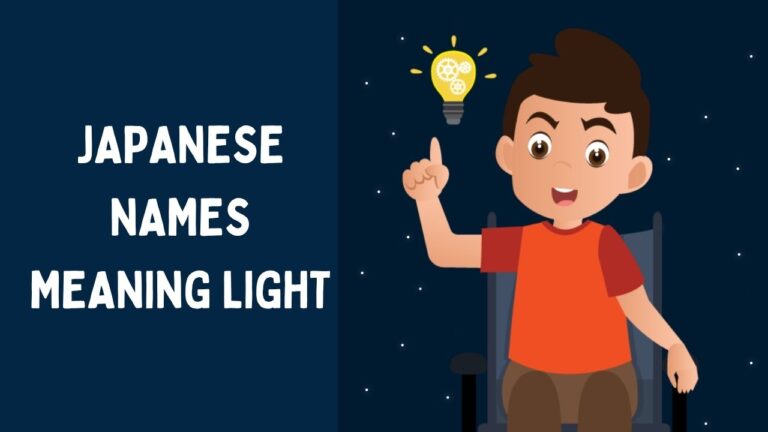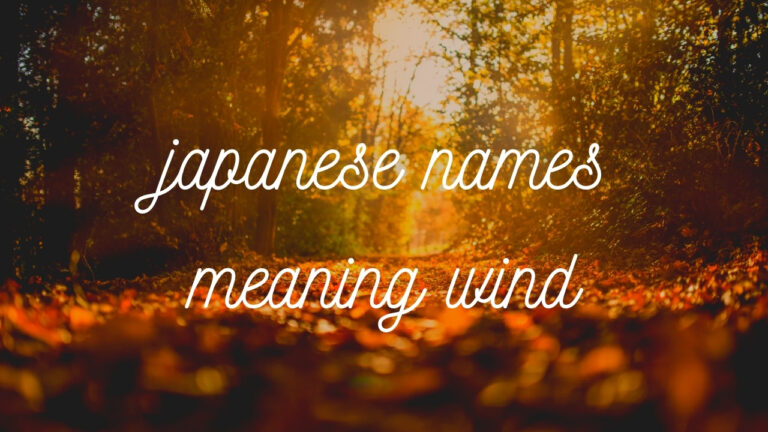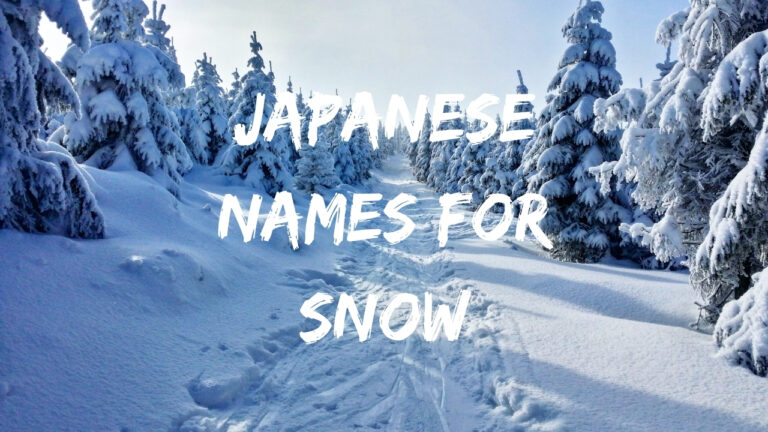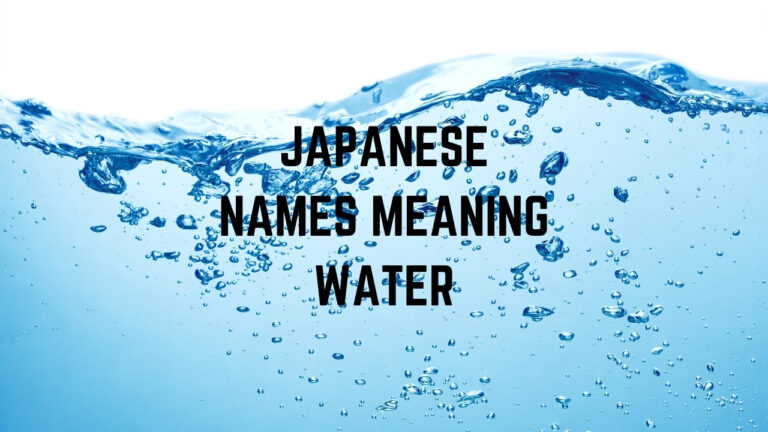165+ Japanese Names That Start With A – Unique & Meaningful
Japanese names that start with A is a beautiful way to discover the meaning and charm hidden in Japanese culture. These names are often inspired by nature, seasons, emotions, and even virtues. Whether you are searching for Japanese names that start with A girl or Japanese names that start with A boy, there are many unique choices filled with depth and tradition.
Some names are modern and trendy, while others have been passed down through generations. If you’re looking for something special, there are also Japanese names that start with A rare, offering fresh and uncommon options.
For those who prefer gender-neutral choices, you can also find Japanese names that start with A unisex, which are becoming more popular for their flexibility and modern feel.
Also Read:150+ Japanese Names That Start With J – Spiritual & Historical
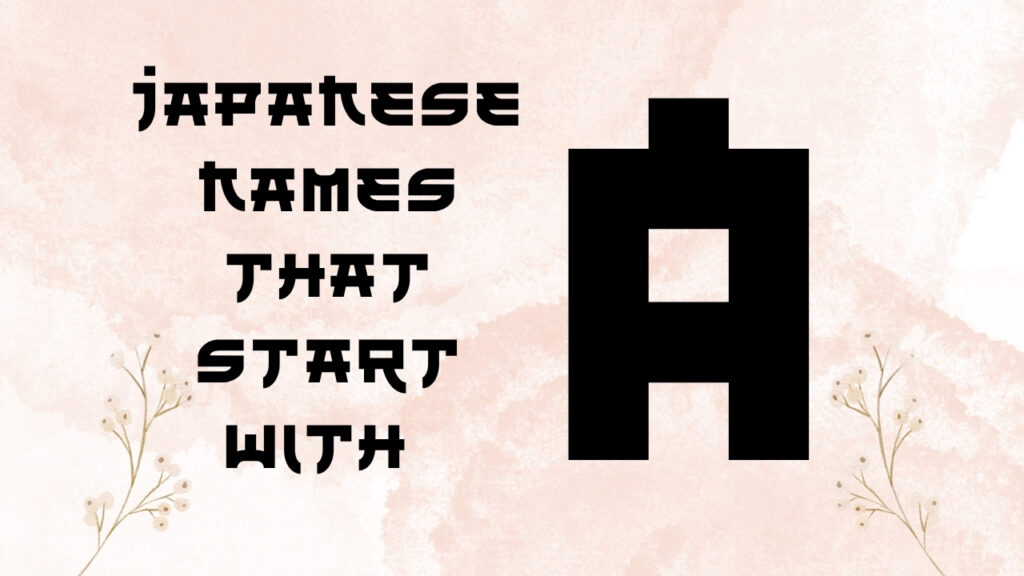
female Japanese names that start with A
- Aiko (愛子 / 藍子) – 愛 means “love” and 子 means “child”. A sweet name meaning “child of love.” 藍子 can also mean “child of indigo.”
- Akari (明莉 / 朱莉) – 明 means “light” and 莉 is a type of jasmine. Often means “bright jasmine” or “light and beauty.”
- Asuka (明日香 / 飛鳥) – Can mean “fragrance of tomorrow” or “flying bird,” depending on the kanji.
- Ayaka (彩花 / 綾香) – 彩 means “color” and 花 means “flower.” A lovely name meaning “colorful flower.”
- Ami (亜美 / 愛美) – 美 means “beauty.” The name can mean “second beauty” or “beloved beauty.”
- Anzu (杏) – A short and cute name that means “apricot.”
- Airi (愛莉 / 愛梨) – 愛 means “love,” and 莉 or 梨 mean “jasmine” or “pear.” Commonly means “lovely jasmine.”
- Aina (愛菜 / 愛奈) – Can mean “love and vegetables” or “love and harmony,” depending on the kanji.
- Azusa (梓) – Refers to the Japanese cherry birch tree. A nature-inspired name.
- Arisa (有紗 / 亜里沙) – Can mean “plenty of silk” or “beautiful village and sand,” depending on the kanji.
- Aya (彩 / 綾 / 文) – Multiple meanings like “color,” “pattern,” or “writing.” A very elegant and simple name.
- Akemi (明美 / 朱美) – Means “bright beauty” or “radiant beauty.”
- Ayane (綾音) – 綾 means “design or pattern,” 音 means “sound.” Together, they can mean “beautiful sound.”
- Ayumi (歩美 / 歩実) – 歩 means “to walk” and 美 or 実 means “beauty” or “truth.” Often translated as “a step toward beauty.”
- Airiho (愛梨穂) – Unique name combining “love,” “pear,” and “ear of grain,” symbolizing love and growth.
- Atsuko (敦子 / 温子) – Often means “warm child” or “kind child.”
- Aoba (青葉) – Means “green leaves” or “fresh leaves,” representing new life or spring.
- Azumi (安純 / 安澄) – 安 means “peace,” and the other kanji mean “pure” or “clear.” It reflects calmness and purity.
- Asami (麻美 / 朝美) – 麻 means “hemp” and 美 means “beauty.” It can also mean “morning beauty.”
- Ayu (鮎 / 歩夢) – 鮎 means “sweetfish,” and 歩夢 can mean “walking dream.” A very poetic name.
- Akeno (明乃 / 曙乃) – Often means “bright field” or “of the dawn.”
- Aika (愛佳 / 愛歌) – Means “love and excellence” or “love song.”
- Atsumi (渥美 / 温美) – Can mean “abundant beauty” or “warm beauty.”
- Anri (杏里 / 安里) – 杏 means “apricot,” and 里 means “village.” It gives a calm and gentle feeling.
- Aohana (蒼花 / 青華) – Means “blue flower” or “bright blossom,” rare and poetic.
male Japanese names that start with A
- Akihiro (明宏 / 昭宏) – 明 means “bright,” 宏 means “wide.” It means “bright and broad-minded.”
- Atsushi (篤志 / 淳志) – 篤 means “sincere” or “devoted,” 志 means “will” or “ambition.” A strong and noble name.
- Arata (新) – Means “new” or “fresh.” A modern-sounding name symbolizing new beginnings.
- Asahi (朝日) – Means “morning sun.” A popular name with positive and hopeful imagery.
- Akiyoshi (昭義 / 秋義) – Can mean “bright justice” or “autumn righteousness,” depending on kanji.
- Aoto (蒼翔) – 蒼 means “blue,” 翔 means “fly.” Together it can mean “flying sky blue,” a poetic and cool name.
- Aoiro (青色) – Means “blue color.” A nature-inspired and calm male name.
- Aran (亜嵐) – 亜 means “Asia,” 嵐 means “storm.” A rare name meaning “Asian storm,” full of energy.
- Amane (天音) – 天 means “heaven,” 音 means “sound.” Often means “heavenly sound,” soft yet powerful.
- Akito (彰人 / 秋翔) – Can mean “shining person” or “autumn flight.” Modern and stylish.
- Akinori (昭徳 / 明則) – Means “bright virtue” or “clear rules.” A traditional male name.
- Ayato (綾翔 / 絢翔) – 綾 and 絢 mean “design/pattern,” 翔 means “fly.” A name full of grace and ambition.
- Aoi (葵 / 蒼依) – While also used for girls, this version means “hollyhock” or “blue reliance.” Used as a soft male name.
- Akinobu (昭信 / 明伸) – Means “bright faith” or “clear growth.” Carries a serious and respectful tone.
- Atsuto (篤人) – Means “devoted person” or “serious person.” Simple and strong.
- Akikazu (昭和 / 秋和) – Means “peaceful light” or “harmonious autumn.” Calm and traditional.
- Arinobu (有信) – 有 means “to have,” 信 means “faith.” Together, it means “one with trust.”
- Asuma (飛真 / 朝馬) – Can mean “flying truth” or “morning horse.” A bold and energetic name.
- Aritomo (有朋 / 有朝) – Means “having friends” or “friend of harmony.” Carries warmth and leadership.
- Akiomi (明臣) – 明 means “bright,” 臣 means “minister” or “servant.” It reflects loyalty and wisdom.
- Amano (天野) – A surname used as a first name. Means “field of heaven.” Rare and classic.
- Azuma (東) – Means “east” or “from the east.” Short and strong name.
- Akimasa (昭政 / 秋正) – Means “bright justice” or “autumn righteousness.” A traditional and strong male name.
- Asanori (朝典) – 朝 means “morning,” 典 means “law or rule.” Suggests someone dependable.
- Aito (愛翔 / 亜翔) – 愛 means “love,” 翔 means “fly.” A soft yet ambitious name for boys.
unisex Japanese names that start with A
- Aoiha (葵葉) – 葵 means “hollyhock,” 葉 means “leaf.” A nature-based name meaning “green leaf of hollyhock.”
- Akika (秋花) – 秋 means “autumn,” 花 means “flower.” A seasonal and gender-neutral nature name.
- Asuha (明日葉) – Means “leaf of tomorrow.” A poetic name symbolizing hope and renewal.
- Aru (歩 / 在) – Can mean “walk” or “exist.” Short, modern, and flexible in meaning.
- Amina (亜実菜) – A rare name; 亜 means “Asia/second,” 実 means “truth,” 菜 means “greens.” Balanced and fresh.
- Aikae (愛佳恵) – 愛 means “love,” 佳 means “beautiful,” 恵 means “blessing.” A gentle name full of positivity.
- Amika (亜美香) – A blend of 美 “beauty” and 香 “fragrance.” Works well for both boys and girls.
- Aomi (青海) – 青 means “blue,” 海 means “sea.” A calm, ocean-inspired unisex name.
- Aenon (愛乃音) – A creative name meaning “loving sound.” Suitable for a peaceful personality.
- Arisu (亜莉寿) – A phonetic spelling of “Alice” using Japanese kanji. Stylish and gender-neutral in modern Japan.
- Asuna (明砂 / 飛砂) – Means “bright sand” or “flying sand.” A poetic and breezy-sounding name.
- Aoko (青子) – 青 means “blue,” 子 means “child.” Traditionally female but now used for all genders in fiction and modern naming.
- Asari (浅里 / 朝理) – Means “shallow village” or “morning logic.” Rare, calm, and gender-free.
- Anju (杏樹 / 安寿) – 杏 means “apricot,” 樹 means “tree.” A natural and calm name for either gender.
- Amari (天里 / 甘利) – Can mean “heavenly village” or “gentle benefit.” A soft and modern-sounding name.
- Asuto (明翔 / 明翔翔) – Combines “bright” and “fly,” giving meanings like “bright flight.” Modern and aspirational.
- Aera (愛空 / 亜玲羅) – A creative modern name often used in media. 愛空 means “love sky.”
- Anaka (安仲) – 安 means “peace,” 仲 means “relationship” or “middle.” Peaceful and neutral.
- Aoki (青樹) – 青 means “blue,” 樹 means “tree.” Though traditionally a surname, it’s gaining unisex first-name use.
- Ayura (歩裕良) – Combines “walk,” “abundance,” and “good.” Suggests a peaceful and generous spirit.
- Amu (編 / 編夢) – 編 means “weave,” and 夢 means “dream.” A poetic name that feels both soft and creative.
- Aona (青奈) – 青 means “blue,” 奈 is a phonetic kanji. A calm and simple unisex name.
- Arisae (有冴恵) – Unique and modern. Means “existence,” “clear,” and “blessing.”
- Aen (愛縁) – 愛 means “love,” 縁 means “connection.” A deep and spiritual name about bonds and fate.
- Ainao (愛直) – 愛 means “love,” 直 means “honest” or “direct.” A meaningful, unisex name about true love and honesty.
popular Japanese names that start with A
- Aina (愛奈) – 愛 means “love,” 奈 is a common name kanji. A soft and popular name for girls.
- Akariyo (灯良世) – 灯 means “light,” 良 means “good,” 世 means “world.” A name reflecting brightness and kindness.
- Ariya (有耶 / 愛璃矢) – 有 means “to have,” 耶 can mean “question” or be phonetic. Modern and stylish, suitable for any gender.
- Akihisa (昭久 / 明久) – A well-liked male name. Means “bright and long-lasting.”
- Ayakae (彩佳恵) – 彩 means “color,” 佳 means “beautiful,” 恵 means “blessing.” Popular among girls for its soft sound and meaning.
- Arika (在香 / 有香) – “Existence” and “fragrance.” Stylish, often used in anime or media.
- Aotoha (青翔葉) – 青 means “blue,” 翔 means “fly,” 葉 means “leaf.” Poetic and increasingly popular.
- Aihiro (愛広) – 愛 means “love,” 広 means “wide.” A sweet and powerful male name.
- Amikae (亜美佳恵) – A longer girl’s name combining beauty, love, and grace.
- Aoshin (蒼真) – 蒼 means “deep blue,” 真 means “truth.” Common among boys for its strong and pure image.
- Arisuha (亜莉珠葉) – A trendy and creative girl’s name inspired by the word “Alice.”
- Aira (愛良) – 愛 means “love,” 良 means “good.” A cute and modern girl’s name that’s rising in use.
- Akenari (明成) – “Bright success.” A classic boy’s name, often seen in historical or academic contexts.
- Aomiya (青宮) – 青 means “blue,” 宮 means “shrine” or “palace.” A modern and calm name.
- Atsuna (温奈 / 淳奈) – 温 or 淳 means “warm” or “pure,” 奈 is a name-ending kanji. A popular gentle name.
- Aseru (亜世瑠) – A modern unisex name with a stylish and futuristic sound, often seen in pop culture.
- Ainori (愛乃里) – 愛 means “love,” 乃 means “of,” 里 means “village.” Romantic and widely used.
- Asui (明翠) – 明 means “bright,” 翠 means “jade green.” A refreshing and light name.
- Aizumi (愛澄) – 愛 means “love,” 澄 means “clear.” A beautiful name growing in popularity among girls.
- Azuki (小豆) – Means “red bean,” often used as a cute name for girls or pets. Trendy due to its soft sound.
- Akishin (昭心) – 昭 means “bright,” 心 means “heart.” A warm and admired boy’s name.
- Aroma (亜露真) – A phonetic and rare trendy name with a foreign feel. Gaining popularity among younger generations.
- Aitoa (愛翔亜) – 愛 means “love,” 翔 means “fly,” 亜 means “Asia/second.” A dreamy and modern combination.
- Ayumuya (歩夢也) – 歩 means “walk,” 夢 means “dream,” 也 is a name-ending kanji. Symbolizes moving toward dreams.
- Akarumi (明美里) – 明 means “bright,” 美 means “beautiful,” 里 means “village.” A charming and classic name.
historical Japanese names that start with A
- Abe (安倍) – A famous samurai clan name; most notably, Abe no Seimei, a legendary onmyoji (spiritual master).
- Akizane (秋実) – 秋 means “autumn,” 実 means “truth” or “fruit.” Used by samurai or aristocrats in old Japan.
- Arinobu (有信) – Means “one who has faith.” Appeared in feudal family names.
- Aritomo (有朋) – Name of Yamagata Aritomo (山縣 有朋), a key figure in Meiji Restoration politics.
- Akihide (明秀) – 明 means “bright,” 秀 means “excellent.” Found in noble or scholarly lineages.
- Asatada (朝忠) – 朝 means “morning,” 忠 means “loyalty.” Name of a Heian-period courtier and poet.
- Aritsune (有常) – “One who always exists” or “constant one.” Rare but appeared in noble families.
- Akisue (顕季) – 顕 means “appear” or “prominent,” 季 means “season.” Used by Fujiwara clan members.
- Akimoto (秋元) – A surname meaning “origin of autumn.” Appears in Edo-era family registries.
- Asanaga (浅長) – 浅 means “shallow,” 長 means “long” or “leader.” Seen in old records of rural lords.
- Aritaka (有隆) – “Noble and prosperous.” Found among feudal lords and retainers.
- Akishige (昭重) – “Bright and serious” or “respected.” Historical samurai-era male name.
- Anenari (安斉) – 安 means “peace,” 斉 means “together.” Appeared in Edo-period ruling families.
- Akamatsu (赤松) – “Red pine.” A powerful daimyō family name during the Muromachi period.
- Ariakira (有明) – “Bright existence.” Historically used in imperial and noble circles.
- Asakura (朝倉) – A famous clan name from the Sengoku period; Asakura Yoshikage ruled Echizen Province.
- Arito (有登) – “One who climbs or rises.” Used among court and military ranks.
- Akinaga (昭長) – “Long-lasting brightness.” Found in old war records and scrolls.
- Azai (浅井) – A prominent Sengoku-period clan name. Azai Nagamasa married into the Oda family.
- Aritakae (有高恵) – A rare combination of “noble,” “high,” and “blessing.” Likely aristocratic.
- Anriyo (安良与) – “Peaceful and good.” Unique in court documents and literature.
- Akimasa (明政) – “Bright governance.” Common among historical scholars and politicians.
- Ashikaga (足利) – One of the most famous historical clan names; ruled Japan during the Ashikaga (Muromachi) shogunate.
- Arikuni (有邦) – “One who has a country.” A strong and powerful name tied to leadership.
- Arinaga (有長) – “One with longevity.” Found in samurai rosters and historic manuscripts.
spiritual Japanese names that start with A
- Amateru (天照) – Derived from Amaterasu, the sun goddess. 天 means “heaven,” 照 means “shine.” A divine and powerful spiritual name.
- Amano (天乃) – 天 means “heaven,” 乃 is a classical possessive. Often linked to celestial or spiritual origins.
- Amehana (雨花) – 雨 means “rain,” 花 means “flower.” Symbolizes spiritual purity and blessings through nature.
- Anshin (安心) – 安 means “peace,” 心 means “heart.” A calming name meaning “peace of mind.”
- Asukae (飛栄 / 明栄) – Can mean “flying glory” or “shining prosperity.” Carries uplifting spiritual energy.
- Aizen (愛染) – Associated with Aizen Myōō, a Buddhist deity of love and passion. 愛 means “love,” 染 means “to dye.”
- Amefuri (雨降) – Means “rainfall.” Rain is often a spiritual cleanser in Japanese symbolism.
- Aokimi (青君) – 青 means “blue” (purity and calm), 君 means “lord.” Has a mystical tone with nobility and serenity.
- Aroha (亜露羽) – A modern spiritual-sounding name inspired by peace and light. 羽 means “feather,” symbolizing the soul.
- Asahiko (朝彦) – 朝 means “morning,” 彦 means “prince” or “man.” Symbolizes renewal and spiritual beginning.
- Aikami (愛神) – 愛 means “love,” 神 means “god” or “spirit.” “Divine love,” full of sacred meaning.
- Ameji (天慈) – 天 means “heaven,” 慈 means “compassion.” A highly spiritual name meaning “heavenly kindness.”
- Anyo (安陽) – 安 means “peace,” 陽 means “sun.” A peaceful name that radiates light and hope.
- Amakiyo (天清) – 天 means “heaven,” 清 means “pure.” Refers to purity of spirit or divine clarity.
- Aromi (亜露美) – A poetic name, combining “Asia,” “dew,” and “beauty.” Dew often symbolizes fleeting divine beauty.
- Akishin (明神) – 明 means “bright,” 神 means “god.” “Shining spirit” or “bright deity.” Used in Shinto contexts.
- Amani (天仁) – 天 means “heaven,” 仁 means “benevolence.” Symbolizes a gentle spirit from the heavens.
- Asuho (明穂) – 明 means “bright,” 穂 means “ear of grain.” Suggests spiritual harvest or enlightenment.
- Ameka (天香) – “Heavenly fragrance.” Associated with divine presence or sacred purity.
- Akiho (秋穂) – 秋 means “autumn,” 穂 means “grain.” Spiritually tied to gratitude and nature’s gifts.
- Aiyori (愛頼) – 愛 means “love,” 頼 means “trust.” Represents divine trust and compassionate strength.
- Aokura (青蔵) – 青 means “blue,” 蔵 means “storehouse.” Symbolizes a deep, calm soul that stores wisdom.
- Ayasu (綾寿) – 綾 means “pattern” or “fabric,” 寿 means “longevity.” Spiritually linked to the woven thread of life.
- Anya (安夜) – 安 means “peace,” 夜 means “night.” “Peaceful night,” symbolizing rest and spiritual dreams.
- Arahiko (荒彦) – 荒 means “wild” or “spirit of nature,” 彦 means “boy” or “young man.” Reflects a raw, divine force.
rare Japanese names that start with A
- Azukiya (小豆谷) – 小豆 means “red bean,” 谷 means “valley.” A rare name with a warm, earthy feel.
- Aro (亜路) – 亜 means “Asia” or “second,” 路 means “path.” A unique name meaning “path of the East.”
- Aseri (朝璃) – 朝 means “morning,” 璃 means “glassy gem.” Symbolizes a new day with clarity and sparkle.
- Aruha (在羽) – 在 means “to exist,” 羽 means “feather.” Implies a light and free spirit.
- Aoshika (青鹿) – 青 means “blue,” 鹿 means “deer.” Rare nature-based name with calm and elegant energy.
- Amekage (雨影) – 雨 means “rain,” 影 means “shadow.” A poetic and mysterious name.
- Aitsuki (愛月) – 愛 means “love,” 月 means “moon.” “Loved moon” – dreamy and gentle.
- Asuhi (明日陽) – 明日 means “tomorrow,” 陽 means “sun.” Suggests future brightness or a hopeful day.
- Aromae (亜露芽恵) – Unique modern name; means “sprouting dew with grace.”
- Arihime (有姫) – 有 means “to have,” 姫 means “princess.” A rare and elegant girl’s name.
- Aojiru (青汁) – 青 means “green/blue,” 汁 means “juice.” Rarely used but trendy in fictional or artistic contexts.
- Aenami (愛波) – 愛 means “love,” 波 means “wave.” Symbolizes emotions and flow of love.
- Amayui (天結) – 天 means “heaven,” 結 means “tie/bond.” A spiritual, rare name symbolizing divine connection.
- Aozane (青実) – 青 means “blue,” 実 means “fruit” or “truth.” Means “true blue” or “pure truth.”
- Aichika (愛知佳) – 愛 means “love,” 知 means “wisdom,” 佳 means “fine.” A rare and meaningful blend.
- Aikara (愛華良) – 愛 means “love,” 華 means “flower,” 良 means “good.” A lovely and elegant name.
- Ayurai (歩来) – 歩 means “walk,” 来 means “to come.” Symbolizes someone who comes with progress.
- Asuhana (明日花) – 明日 means “tomorrow,” 花 means “flower.” A blooming hope.
- Akunari (朱成) – 朱 means “vermilion/red,” 成 means “to become.” A striking and rare name.
- Aseka (汗香) – 汗 means “sweat,” 香 means “fragrance.” Very rare, possibly poetic or character-inspired.
- Aiyume (愛夢) – 愛 means “love,” 夢 means “dream.” “Dream of love” – soft and idealistic.
- Amekusa (雨草) – 雨 means “rain,” 草 means “grass.” Symbolizes growth, peace, and natural renewal.
- Aohara (青原) – 青 means “blue,” 原 means “field.” A calm, countryside-inspired rare name.
- Asariyo (浅理世) – 浅 means “shallow/light,” 理 means “logic,” 世 means “world.” Abstract and intellectual.
- Amanari (天成) – 天 means “heaven,” 成 means “to become.” Symbolizes destiny or becoming something divine.
Conclusion
Japanese names that start with A offer a wide variety of meanings, styles, and cultural depth. From rare and historical names to spiritual and modern choices, each one reflects unique qualities tied to nature, tradition, or personal expression.
Whether you’re drawn to names with poetic charm or those rooted in ancient heritage, the A-initial names provide a meaningful starting point for anyone exploring Japanese naming culture.

